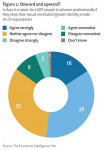Lack of job opportunities at larger firms is an important spur for South Korea’s entrepreneurs, says new Economist Intelligence Unit survey
Around half of the South Korean SBPs (defined for this research as enterprises with annual turnover of less than US$10m) surveyed say entrepreneurial zeal and a desire for personal achievement were the main motivations for setting up their own business, followed closely by a desire for a challenge (42%). In striking contrast to their regional peers, 41% say dissatisfaction with corporate job opportunities spurred them into starting their own businesses. That is twice as high as the five-country average of 20%.
South Korean SBPs long-term plans are also different to those of other Asian countries. Respondents to the five-country Asian survey generally favoured handing over the business to professional management over the longer term. But South Korean respondents are split equally between professional managers and passing the business to their children·33% of South Korean SBPs hope that their children will eventually inherit the business (only 28% say so regionally), while another 33% says they intend to hand the reins over to professionals after growing the business (43% plan to do that regionally).
Other key findings from the survey, conducted in September and October 2006, are as follows:
· South Korean SBPs favour a strategy of expanding nationally. Almost half of surveyed South Korean SBPs think expanding nationally is their best strategy for growth versus the Asian average of 22.7%. About 45% also think expanding internationally is important, while 35% say the same about doing so regionally.
· Finding a niche market is key to South Korean SBPs’ competitiveness, according to 38% of survey respondents. The South Korean SBPs feel they understand the local market better (35%) than larger firms and can cater for it with better quality products and services (31%). Although they realise the importance of intimacy with customers (23%) and dexterity to make quick decisions (28%), South Korean SBPs regard these two factors as less important than the overall Asian sample.
· Shortage of financing is a major, but not overwhelming, challenge. South Korean respondents cite a shortage of financing, lack of resources and expertise, fewer economies of scale and more demanding customers as their biggest challenges in equal measure (28%). These are followed by rising costs of labour (25%) and a shortage of skilled staff (22%). Finance, tax and accounting are the areas where they feel they need the most external guidance (51%), followed closely by marketing and sales (both 43%), and business strategy (35%).
“South Korea’s small businesses and professionals, like most of their counterparts in Asia, display an entrepreneurial vibrancy that is vital for an economy to develop. They form an important segment of the SMEs that are fuelling growth in the region,” says Bina Jang, senior editor with the Economist Intelligence Unit and manager of the project.
According to Citibank’s Global Consumer Group, “Citibank commissioned this Economist Intelligence Unit report on small businesses and professionals or SBPs because we want to understand the needs of this specific segment so we can better serve them. SBPs want to be recognised and served as a priority customer group·not as the lower tier of larger businesses.”
About the research
The survey polled 677small businesses and professionals (SBPs) in five Asian economies: Hong Kong, India, Malaysia, Singapore and South Korea. In South Korea, 109 SBPs responded.
Of the South Korean respondents, 38% have annual turnover of W1.9bn to W9.7bn and another 33% have annual turnover of W485m to W1.9bn. In terms of staff, 31% have 5-20 employees, while 24% have 21-50 employees.
The views expressed are those of the Economist Intelligence Unit alone.
About the Economist Intelligence Unit
The Economist Intelligence Unit is the world leader in global business intelligence. It is the business-to-business arm of The Economist Group, which publishes The Economist newspaper.
The Economist Intelligence Unit provides geopolitical, economic and business analysis on more than 200 countries, as well as strategic intelligence on key industries and management practices. With over 300 full-time professionals in 40 offices around the world, supported by a global network of more than 700 contributing analysts, the Economist Intelligence Unit is widely known for its unparalleled coverage of major and emerging markets.
웹사이트: http://www.eiu.com
연락처
Edgar Fernandez
Marketing Manager, Asia-Pacific
(852) 2585 3826 이메일 보내기
Fax: (852) 2802 7007
이 보도자료는 Economist Intelligence Unit가(이) 작성해 뉴스와이어 서비스를 통해 배포한 뉴스입니다.




